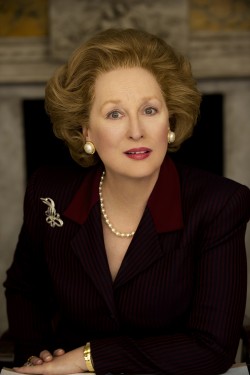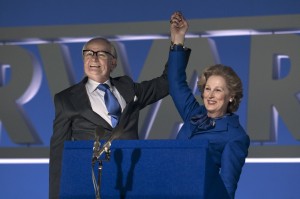‘THE IRON LADY’ REVIEW: Meryl Streep turns in a great performance in a mediocre movie

Margaret Thatcher deserves better than the The Iron Lady.
This doesn’t mean I’m a staunch supporter of the former prime minister of Great Britain. But there’s no denying that this woman changed the course of history and inspired Western civilization — and the rest of the world — that a female could lead a government and earn professional respect in a man’s world. She attained the highest office possible in her native country, and that makes her candidacy in the late 1970s one of the most empowering and inspiring.
Her politics, to be sure, are deservedly controversial. It’s difficult to defend her foreign policy record (namely her militaristic reaction to unprovoked attacks in the Falklands) and her strained dealings with the workers’ unions (the coal miners’ strike will forever be a blot on her resume). But calling into question specific issues about her professional experience can never take away the fact that she rose through the ranks, stuck to her principles and accomplished an unbelievable amount of change in the 11 years she served atop the British government.
Now comes The Iron Lady, director Phyllida Lloyd’s unfortunately disappointing biopic that features an exquisitely rendered performance by Meryl Streep, perhaps our generation’s greatest living actress. At a slim 105 minutes, the movie feels like a cheap paperback novel, when Thatcher’s story deserves so much more care and subtext. If ever there were a public figure that earned the right to a miniseries it would be “Maggie.”
This shouldn’t discount Streep’s obvious mastering of the role. She nails the accent, and the makeup department recreates Thatcher during various stages of her life with an uncanny preciseness. There are many times throughout The Iron Lady when it feels as if we’ve left the cinematic comforts of the movie theater and entered Thatcher’s London apartment. The look and feel of Streep’s performance are scarily effective. It was probably inevitable that the movie wouldn’t match that excellence.
The problem lies with the script by Abi Morgan. Rather than looking at Thatcher’s most influential years (1979 to 1990), when she served in the top post at 10 Downing St., the movie focuses on her recent years of increasing dementia outside the public spotlight. The choice to show this once powerful woman in a withering state, where she’s almost unrecognizable when purchasing milk at the local convenience store, borders on the egregious. Why should we consider Thatcher in her old age when her mind begins to slip, and not when she tore through her political opponents on the floor of Parliament? I feel like we’ve been given an exploitative view of a patient in the hospital, totally disregarding the fact that this person once rose to the top rung of the political ladder.

Yes, it humanizes Thatcher by showing her fussing about her apartment, talking to her dead husband (Jim Broadbent) and forgetting the facts of her public service. But this humanization comes at a large expense. We come to know Thatcher as she nears her final years, but learn very little of her enormously iconic professional career.
Instead, we are given annoying flashbacks that almost always feel like montages. We never dig into the trenches and find out why this person ticks. What makes her get up in the morning and cut against the grain? Why her and not someone else?
There’s almost no mention of the economic strife in the 1980s, except for a few lines of dialogue. Russia and the end of the Cold War are glossed over with newsreel footage. The only subject to receive more than a passing glance is the Falklands War, and even then The Iron Lady is unsure of what to make of the foreign fiasco.
Throughout this scatterbrain plot, Streep keeps everything centered around her fine, fine performance. And, because of her excellence, it’s easy to forgive the movie’s failings. But more often than not, one needs to look at Streep’s work as a diamond in the rough. It’s not a wasted effort, but it’s a worthy acting role stuck in a banal film.
Margaret Thatcher deserves a film that sparks debate, creates controversy and leaves us rethinking her place in history. What this influential leader doesn’t need is an Oscar-bait movie that’s sole purpose is to show off an excellent acting job. They’ve got the role down pat; now they just have figure out why it’s worth telling the story in the first place.
By John Soltes / Publisher / John@HollywoodSoapbox.com
-
The Iron Lady
-
2011
-
Directed by Phyllida Lloyd
-
Written by Abi Morgan
-
Starring Meryl Streep, Jim Broadbent and Richard E. Grant
-
Running time: 105 minutes
-
Rated PG-13 for some violent images and brief nudity
-
Rating:






“(namely her militaristic reaction to unprovoked attacks in the Falklands)”
What a way to describe an invasion led by the Argentinian military government to divert the attention of its angry citizens!
Well, I respect your point … but I think that’s a pretty simple and accurate way of describing it. The original attacks on the Falklands by the Argentinians were unprovoked and Thatcher’s government responded with its own military attack. Of course, the success of the campaign led to Thatcher’s and the Conservative government’s reelection.
I am fully on Britain´s side concerning the Falkland War and am in no way anti-American. It will be very interesting to see how the peace-loving Obama would react if Mexico launched an unprovoked takeover of El Paso.
“The only subject to receive more than a passing glance is the Falklands War, and even then The Iron Lady is unsure of what to make of the foreign fiasco.”
” It’s difficult to defend her foreign policy record (namely her militaristic reaction to unprovoked attacks in the Falklands)…”
What a ridiculous way to describe the military action to defend´s one territories.
Surely more than 95% of commentators on the film are Caucasians; they never complain why the film does not cover the return of Hong Kong to China. Mrs. Thatcher was actively involved in the negotiations; she presided over the end of the British empire while in office.
The film is told from the perspective of a woman with a failing memory, there are plenty of TV shows on Thatcher´s career if you want a simple biopic.
You bring up good points. Yes, the Hong Kong negotiations would have been a nice addition to the movie. One thing I should point out: I’m interested to see who actually enjoys “The Iron Lady”. Is is a movie that attracts the admiration of Thatcher supporters or detractors?
I imagine that many will walk away completely entranced by Streep’s portrayal, but may find the film lacking in detail.